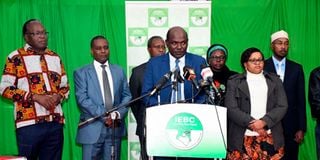Premium
Suing IEBC commissioners is strategy to split them further - Legal experts

Independent Electoral and Boundaries Commission chairman Wafula Chebukati (centre) addresses journalists at the Bomas of Kenya about the transmission of election results and the commission’s preparedness while flanked by other commissioners.
The suing of members of the electoral commission by some of the presidential election petitioners will further expose the factional wrangles at the polls agency, legal pundits say.
Lawyers have described their suing, in their individual capacities, as a “misjoinder” since they are public officers protected from legal suits over their official decisions. They also say the commission is a corporate body.
They observe that suing of the commissioners could be a political strategy designed to expose the internal wrangles at the Independent Electoral and Boundaries Commission (IEBC) chaired by Mr Wafula Chebukati.
Constitutional lawyers Omwanza Ombati and Shadrack Wambui say it’s a political strategy to discredit the presidential results.
“The suit is an invitation to the court the dispute so that it opens up a window for the four-member splinter group to file affidavits and put at risk the declaration made by Mr Chebukati. It looks like a strategy designed to give them a platform to fight the chairman in court,” says Mr Wambui.
In the petitions filed by voter David Kariuki and Azimio la Umoja-One Kenya party leader Raila Odinga, the seven commissioners are listed as respondents.
Other than Mr Chebukati, the other commissioners are Juliana Cherera (vice-chairman), Mr Francis Wanderi, Ms Irene Masit, Mr Justus Nyang'aya, Prof Abdi Guliye and Mr Boya Molu. In the previous petitions filed in 2013 and 2017, the commissioners were not sued in person.
The commission is split into two factions, one led by Mr Chebukati, and the other by Ms Cherera. The chairman has Prof Guliye and Mr Molu on his side, while the vice-chairman has Mr Wanderi, Ms Masit and Mr Nyang’aya.
“Some of the commissioners are reading from the same script with Azimio. Listing them as respondents in the presidential petition is that they file affidavits and build the case that petitioners are trying to make against IEBC,” states Mr Wambui.
He says the suit is irrelevant because there’s no order or declaration that the petitioners are seeking against any of the commissioners in person.
“It does not make sense when you see them being mentioned as respondents. A person becomes a respondent because you want something from them. The petitions as filed do not seek anything from the members but from the commission and its chairman. Representing them as respondents is inelegant drafting,” says Mr Wambui.
He argues that the suit is designed to make the four dissenting commissioners co-petitioners in the event they file responses and affidavits supporting the petition to quash Mr Chebukati’s decision to declare Dr William Ruto as the President-elect.
“These are people are out to paint Mr Chebukati black. The four of them are reading the same script with Azimio,” says Mr Wambui.
Mr Ombati says by naming the commissioners as respondents, the petitioners are looking for assistance to back up the presidential suit.
“The petitioners want to achieve a situation where the commissioners will appear as co-petitioners and push the case. It is invitation to bring evidence on behalf of petitioners.
“IEBC commissioners do not appear in court in person because the commission is a body corporate. Under the presidential election rules, the only person who can appear is the commission and the returning officer.”
He says the other parties, including IEBC, may ask the court to have the commissioners struck out of the suit.
This is the first time IEBC commissioners are being sued. It is also the first time that some members of the commission have disowned presidential election results announced by their chairman.
Their suing has opened a legal debate on what is their relevance in tallying of votes in a presidential election and declaration of results.
Download a copy of Raila's Supreme Court petition: Raila Odinga petition download





